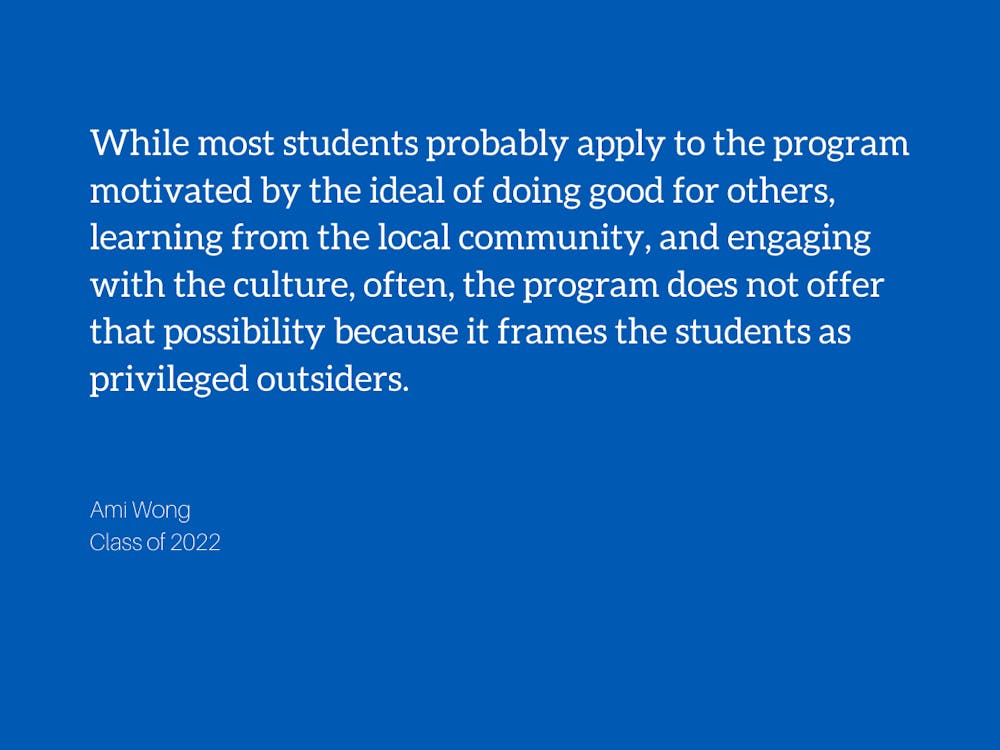On Friday, many students will send in their applications for DukeEngage, the summer volunteering program comprised of both domestic and international projects. Students will get the opportunity to teach English in China, practice environmental conservation in Thailand or create culturally responsive educational tools in Chicago. When they go, they bring with them the ideal of doing good in communities around the world.
The result, however, is not always as glamorous. Student experiences vary widely, and many others lampoon DukeEngage for simply being voluntourism or perpetuating the savior narrative. Considering the amount of money that is poured into DukeEngage every year, this presents a problem—the program may not even be reaching its purported goals.
DukeEngage is an example of a good idea that is poorly executed. The website claims that the program is meant to “[empower] students to address critical human needs by fully funding a summer of immersive service, in the process transforming students, advancing the University’s educational mission, and providing meaningful assistance to communities in the U.S. and abroad.” However, the program instead reveals a telling indication of privilege: it fosters performative altruism instead of genuine empathy.
What is the difference between performative altruism and empathy? Performative altruism is doing something for the benefit of another because it benefits oneself, usually in the form of social clout or improved reputation. Empathy is, colloquially, “putting yourself in someone else’s shoes.” It does not necessarily entail an act of altruism, but it does require looking through another’s perspective.
The key problem is the fact that DukeEngage is not motivated by empathy. While most students probably apply to the program motivated by the ideal of doing good for others, learning from the local community, and engaging with the culture, often, the program does not offer that possibility because it frames the students as privileged outsiders. Instead, the program serves as a way to bolster Duke’s reputation. On Duke’s Global Affairs page, they list DukeEngage as “one of the top-cited reasons why prospective students choose Duke.” Duke is consequently aware of DukeEngage’s reputation and its beneficial effects for the school.
Unless it is an essential part of the program, students do not interact with locals. If they do, it is through the lens of their service. This relationship has two effects. First, it separates the students from the local culture, clearly segregating their communities. Second, it fosters a savior complex, where students are positioned as helping—and therefore are positioned as powerful.
This kind of relationship builds the idea that Duke students are part of an elite community, and that lesser privileged communities require their help to build themselves up. In addition, the ineffectualness of many programs reinforces the performative aspect because the mission is not actually achieved. Many students report that the programs were disorganized and they did not feel that they had made a difference. One student called the UK program a “complete waste of time” and a “marketing ploy.” Another student I talked to in the China program said that they “didn’t do anything.”
Although DukeEngage has these problems, it is not without benefit. It operates on the principle of service-learning for education, which has many benefits, including the development of civic identity and responsibility. To achieve these goals, however, the program needs to be reworked.
Without actually engaging with local communities, students will not be able to see themselves as a part of them. For example, while environmental conservation directly helps the members of the local area, it also helps the global community as a whole. Understanding one’s position in relation to a community will lead to empathy and a sense of civic responsibility. One way to facilitate this result would be to have weekly discussions during the program to discuss what has concretely been accomplished, plan for future goals, and reflect on their roles and responsibilities.
With empathy and civic responsibility, we stay motivated because we care and understand our duty to contribute to the world in a meaningful way. If DukeEngage is able to foster these traits, then students will continue to do genuine altruism in the future, not for reputation or for a paid trip to voluntour.
Ami Wong is a Trinity sophomore. Her column, “the bigger picture,” runs on alternate Fridays.
Get The Chronicle straight to your inbox
Signup for our weekly newsletter. Cancel at any time.

